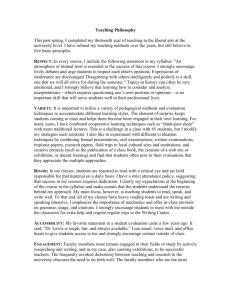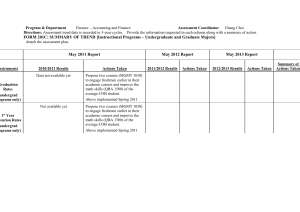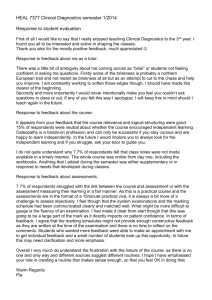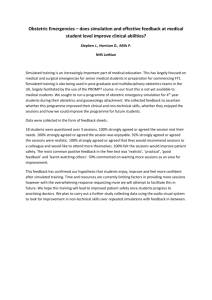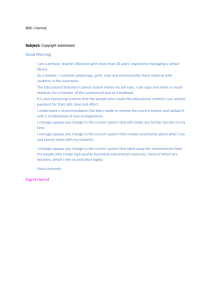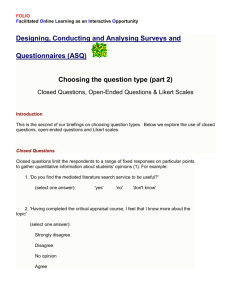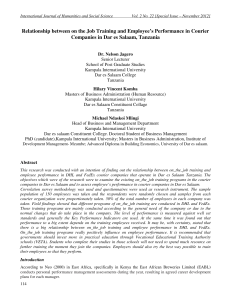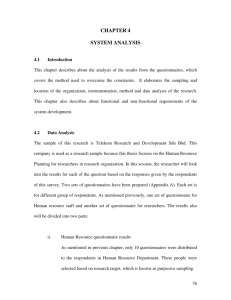Population Health major evaluation
advertisement
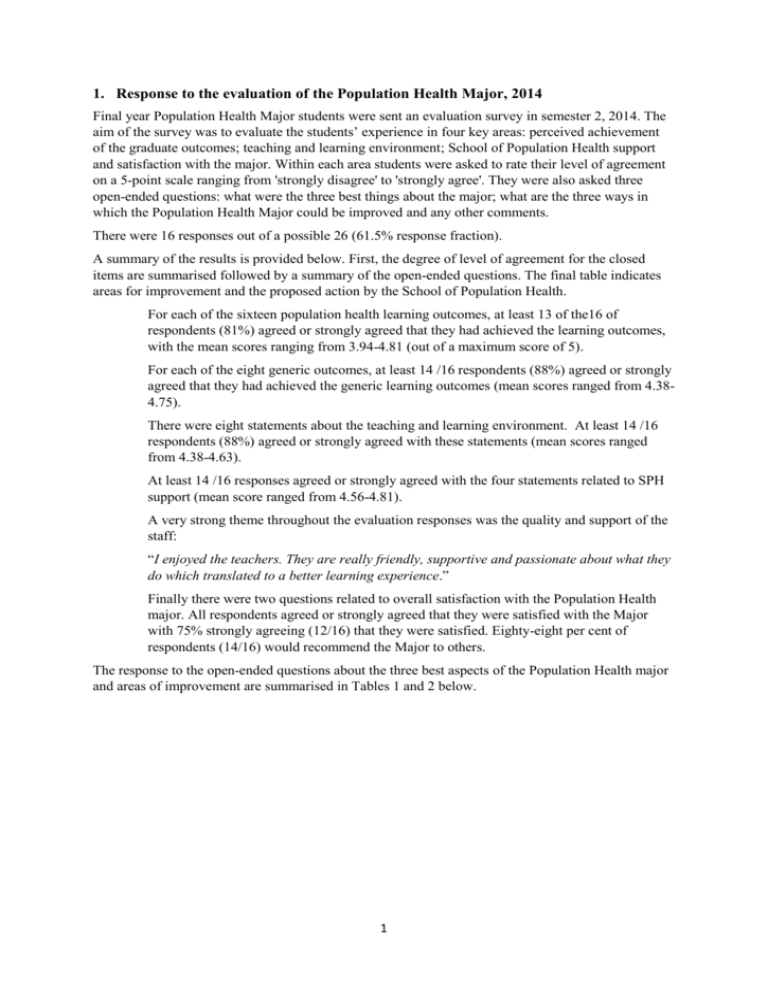
1. Response to the evaluation of the Population Health Major, 2014 Final year Population Health Major students were sent an evaluation survey in semester 2, 2014. The aim of the survey was to evaluate the students’ experience in four key areas: perceived achievement of the graduate outcomes; teaching and learning environment; School of Population Health support and satisfaction with the major. Within each area students were asked to rate their level of agreement on a 5-point scale ranging from 'strongly disagree' to 'strongly agree'. They were also asked three open-ended questions: what were the three best things about the major; what are the three ways in which the Population Health Major could be improved and any other comments. There were 16 responses out of a possible 26 (61.5% response fraction). A summary of the results is provided below. First, the degree of level of agreement for the closed items are summarised followed by a summary of the open-ended questions. The final table indicates areas for improvement and the proposed action by the School of Population Health. For each of the sixteen population health learning outcomes, at least 13 of the16 of respondents (81%) agreed or strongly agreed that they had achieved the learning outcomes, with the mean scores ranging from 3.94-4.81 (out of a maximum score of 5). For each of the eight generic outcomes, at least 14 /16 respondents (88%) agreed or strongly agreed that they had achieved the generic learning outcomes (mean scores ranged from 4.384.75). There were eight statements about the teaching and learning environment. At least 14 /16 respondents (88%) agreed or strongly agreed with these statements (mean scores ranged from 4.38-4.63). At least 14 /16 responses agreed or strongly agreed with the four statements related to SPH support (mean score ranged from 4.56-4.81). A very strong theme throughout the evaluation responses was the quality and support of the staff: “I enjoyed the teachers. They are really friendly, supportive and passionate about what they do which translated to a better learning experience.” Finally there were two questions related to overall satisfaction with the Population Health major. All respondents agreed or strongly agreed that they were satisfied with the Major with 75% strongly agreeing (12/16) that they were satisfied. Eighty-eight per cent of respondents (14/16) would recommend the Major to others. The response to the open-ended questions about the three best aspects of the Population Health major and areas of improvement are summarised in Tables 1 and 2 below. 1 Table 1 Summary of comments related to best aspects of the Population Health major Area Number of comments Staff quality and support 11 Practical component / work experience / field work 11 Small friendly cohort 8 Holistic learning / diversity 6 Group work / projects 3 Vertical integration 2 Table 2 Summary of areas for improvement within the Population Health major Areas for improvement (number of comments) School of Population Health Response PUBH2203) Epidemiology and biostatistics probably ought to be two separate units because I know myself and many of the other students were very interested in that field and would have liked to have been able to go into more depth (2)// Skills learnt in biostatistics and epidemiology were only really used in the one unit, and in order to cement these concepts in our minds and become more familiar with then and confident in using them, it would be good to incorporate more of these skills into other units (1)/ Biostatistics unit seemed overwhelming (1). We acknowledge that this unit is challenging and will continue to work towards making the unit more accessible for students. These changes will be evaluated through SPOT and SURF. PUBH3301 Health Industry Leadership (4)- comments re content and learning experience and overlap between PUBH3301 and PUBH3307 (1). The unit content has been reviewed and revised. Unit coordinators have met to review overlapping material. The impact of these changes will be evaluated through SPOT and SURF. More options: Make PUBH2209 and PUBH2208- make these units core to the major (1); have more options (2). We are promoting these units to students in the Major to a greater degree. The link between PUBH2203 and PUBH3305 and PUBH3302 will be emphasised in each unit PUBH2209 is moving to S1 so that the electives are not in the same semester. As the number of students in the Major grows there may be the opportunity to add further options. Clash between Population Health and Aboriginal Health units, Timetable requests documenting which units should not be timetabled at the same time were submitted in 2014.Some clashes have been avoided but there are clashes with a 2nd year AHEA unit and PUBH3305. The timetable document has been updated to include a 2 request that AHEA2201 not be timetabled with either PUBH3305 or PUBH3301 in future years. Reinstate Practicum (7) A practicum unit was in development in 2014 and has been offered for the first time this year as an elective. (PUBH3308 Population Health Practicum). Incorporate field trips to Aboriginal communities (1) Advice has been sought from CAMDH and will be sought from WA Centre for Rural Health on this possibility. Students doing population health as their degree specific major, are required to take AHEA2201, which incorporates some field visits. AHEA3200 Aboriginal Health Community Organisation Placement will be promoted as an elective in order to provide that opportunity. PUBH3308 will include the opportunity to undertake a practicum-related to Aboriginal health. Assessment - better distribution of individual and group work marks (1) Less exams-reflect upon whether exams add to the learning (2) More practice/mock exams (2). This feedback has been provided to teaching staff Coordinators teaching units in the same semester / year will be reminded prior to the beginning of semester to check their assessment dates with each other. Overlapping due dates for assessment (1) Cohort identify needed earlier/ more about employment earlier / planning ahead for study abroad We agree and we have invited first year students to lunches / morning teas over the last two years but attendance has been very low. However, we are encouraging the student society to hold morning teas on the Nedlands campus. The Population Health Major booklet was written to assist with this aspect of the student experience. More information on employment opportunities will be provided in the population health major booklet. Quality of computers in the lab- The lab is a good collaborative space and better resources could take even more advantage of this On the right section (where most of the computers were problematic) of the lab, 30 computers have been replaced from "Core2Duo" to faster "i5' processor. June 15, 2015 3
